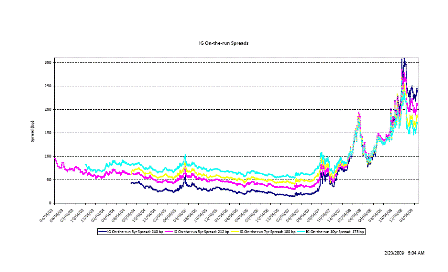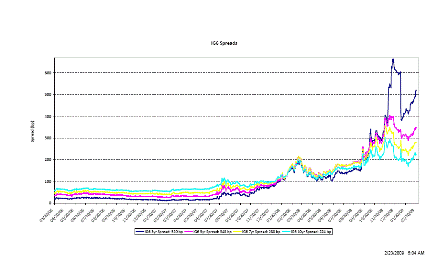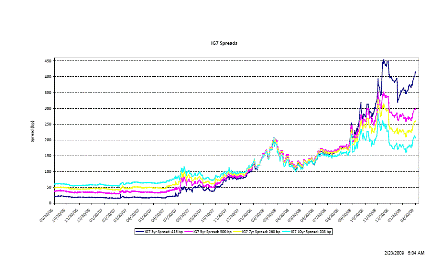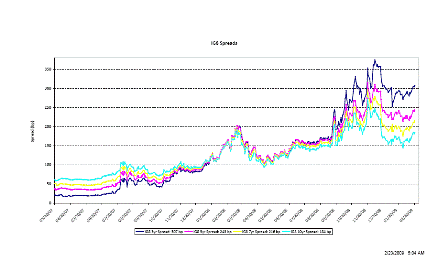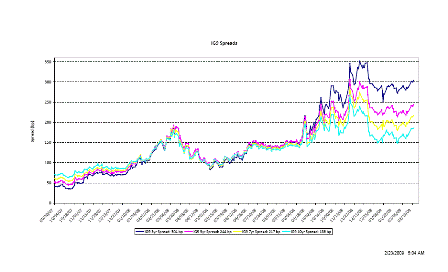[Skip to the end]
(email exchange)
It doesn’t make sense in any model this side of sanity. Comments below:
>
> On Sun, Feb 22, 2009 at 7:47 PM, Steve wrote:
>
> Does this make sense in your model of fiscal policy?….interesting
> counter intuitive argument…
>
Feb 18 (Reuters) — Cutting taxes to try to stimulate the economy could do more harm than good in a zero interest rate environment as it can heighten the risk of deflation, according to a recent New York Federal Reserve study.
Policies that are aimed at increasing the supply of goods can be counterproductive when the main problem is insufficient demand, New York Fed economist Gauti Eggertsson said in a research paper entitled “Can tax cuts deepen the recession?”
Increasing the supply of public goods is never contractionary. Though wise investment can bring down real costs and prices and thereby increase productivity and our real standards of living.
“The emphasis should be on policies that stimulate spending,” Eggertsson said, adding that his research found the impact of tax cuts is “fundamentally different” with interest rates near zero.
“At zero short-term nominal interest rates, tax cuts reduce output in a standard New Keynesian (economic) model. They do so because they increase deflationary pressure,” he wrote. Eggertsson’s study focused primarily on labor taxes and some sales taxes.
There’s the problem- the standard ‘new Keynesian model’ is garbage.
Cutting payroll taxes, for example, would create an incentive for people to work more. But if there are not enough jobs, this could have a negative effect: creating more demand for work and thus driving down wages.
Huh? First of all, for me personally at least, when my income is cut I tend to work more to at least try to make the same income. And when taxes are cut I certainly don’t work more. But that’s just anecdotal.
The main point is there are already millions of unemployed so even if somehow cutting payroll taxes so people struggling to make ends meet can better do so causes a few more people to seek work the pressure on wages can hardly go up.
And maybe the strongest point, these new people supposedly seeking work due to a cut in payroll taxes will only work at the higher wage as a point of this (convoluted) logic which is far different from a market and wage level pressure point of view than the millions of others willing to work at current wages who can’t find work.
Last, the notion that changes in payroll tax could measurably alter wage seekers is extremely far fetched at best and not statistically significant in any case.
And with interest rates near zero, the Fed cannot cut rates further to fight deflation.
As if cutting rates does or ever has fought deflation.
If anything the causation is reversed. The new Keynesian model has this all wrong.
President Barack Obama on Tuesday signed into law a $787 billion package of measures to lift the recession-mired U.S. economy that included about $287 billion in tax cuts.
Eggertsson’s findings counter the argument that cutting taxes to put an extra buck in consumers’ pockets will boost their spending. Instead, given the current economic backdrop, it is likely people would save money from temporary tax cuts,
Yes, this is likely, and not a ‘bad thing’ as it means taxes can be cut at least that much further and/or spending increased further.
given the recession and expectations that tax increases are inevitable in the future.
This is the ‘Ricardian Equivalent’ argument put forth by some of the ‘new Keynesians’ and has largely been dismissed as nonsensical by most. The idea that tax cuts do nothing because people automatically expect higher taxes later as they ‘know’ the budget must eventually be balanced, taken to the extreme, means totally eliminating taxes does nothing for demand which of course is ridiculous.
He said that while a number of economists have argued that aggressive tax cuts are needed to revive the U.S. economy, policy-makers should “view with a great deal of skepticism” studies that use post World War Two data — a period characterized by positive interest rates.
Interest rates have nothing to do with the effect of tax cuts. And history (and all other theory) has shown that tax cuts add to demand, tax increases lower demand.
The best ways to stimulate spending, according to Eggertsson’s study, is through traditional government spending and a credible commitment to boosting inflation, creating an incentive to spend now before prices rise. (Reporting by Kristina Cooke; Editing by Diane Craft)
Good old ‘inflation expectations theory’ again from the new Keynesians, which is also nonsense. It’s a ‘plug’ due to no other theory of where the price level comes from, as they have yet to recognize the currency itself is a public monopoly, and monopolists are necessarily price setters.
[top]

